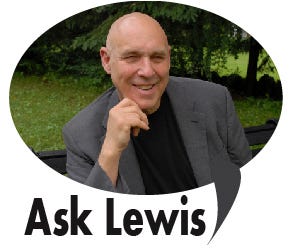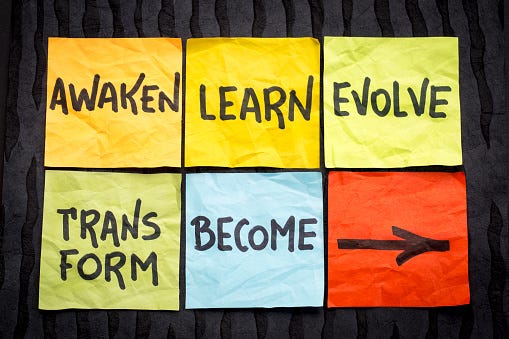The Best Way to Write Your Memoir
“How should I start a memoir?”
“This newsletter serves a demographic of highly intelligent readers, deep thinkers, life hackers, preppers, entrepreneurs, and survivalists. I especially focus on those with a passion for ideas, critical thinking, strategic game theory, and a desire to understand the world around them. Readers of my posts are usually tired of being patronized elsewhere by fact-less, opinionated know-nothings, misinformation, conspiracy theories, and fake news.
“Knowledge is power, wisdom brings meaning, contentment, and happiness!”
The Life Strategies Playbook & Mentoring Program is a reader-supported publication. To receive new posts and support my work, consider becoming a free or paid subscriber. (Sign up for free at the end of this newsletter)
———————————————————
———————————————————
On a personal note: Please excuse grammatical errors, typos, repetition, and any general nonsense, and such in this post. I am getting a bit older now, and I have about 20,000 pages of information that must get published before I leave the mortal coil. I simply write and publish more than my humble editors are able to correct. If you find enough errors you are welcome to contact me about being an editor of my work.
Thanks for sharing this newsletter with your friends and associates -
Join us for daily tips on personal development at our free Self-Improvement for Beginners Community and Forum on Facebook
Click Below or cut and paste the URL to Join
https://www.facebook.com/groups/455029215769173
———————————————————
A 4 - Minute Read
What is the definition of memoirs? That’s one of the most posted questions on Google. A memoir is any nonfiction narrative based on the author's personal memories. Though memories can be flawed, the assertions made in the work are, if we are not told otherwise, understood to be factual.
While memoir has historically been defined as a subcategory of biography or autobiography since the late 20th century, the genre is differentiated in form, presenting a narrowed focus. A biography or autobiography tells the story "of a life", while a memoir often tells the story of a particular event or time, such as touchstone moments and turning points from the author's life.
We can all learn from our failures, successes, and portals of experiences, and I believe it is important to share them.
When I speak to my friends, especially those over sixty, I often suggest they take fifteen minutes a day, to write their memoirs. They generally laugh at the idea, responding that they’re not famous and that their lives are not that interesting.
I disagree with them. As I write my own memories, typing here as I sit halfway through my seventy-first year in this lifecycle, I know that any human who has made it this far has a story to tell, and an interesting one at that!
Human beings are hard-wired to create relationships. Creating, retelling, and sharing stories with and about other humans is one way of making these connections. It is a way to create meaning, even in those things that seem to have no meaning.
To tell a story about one’s life is to share history. Of course the history we may share may not be the truth, nor even be based on facts. History is just a large collection of stories. Even where the facts are verifiable, you never get all the facts; thus, the story you are being told is a selective presentation. There are probably other facts in the very same story that you are not aware of that would change the entire flavor, scope, and purpose of what is being told. This is one of the reasons why so many cultures have less concern with historical accuracy and a greater concern for the relevance of the story, for the story is an expression and reflection of the ever-unfolding community identity. There are hundreds of ways to create a story. There is narration, historical accounts, recitals, jokes, drama, tall tales, parables, comedy, legends, historical events, autobiography, myths, biography, exposés, legends, journalism, confessions, scripts, anecdotes, etc. Often, a decision needs to be made - here the narrative is internal and psychological. In other stories something must be accomplished - this is built around external events that either move the process forward or become obstacles to the journey told in the story. To be a human being by definition is to be a storyteller. Each of us owns and is owned by a personal story that we need to tell. We each have memories of the things that have happened to us. For many of us, the only sense of self we have is the story we have created. What is your story?
Many people have no sense of who they are separate from the story they have created for themselves. Like an actor in a movie all they are doing is living their idea of the “wife” story, the “husband” story, the “employer” role, reciting the “employee lines” etc. Much of what you think of as your personal, factual history is really a mix of fact and fiction filtered through your memory. Living life like this is to be a prisoner of your self-created past. For many, this is often frightening to hear. It is as if who you think you are, is not really who you are. But that “who you are” is based on what you remember as being your truth. It does not matter whether it is true or not, only that you believe that it is true.
It soon becomes clear that at some point in time you will remember things that were once forgotten. Even when you remember these events clearly, there is always the chance they might not have happened exactly as you have remembered them. Have you ever reminisced with a friend about some event, and this person had a totally different recollection of what you remember?
If you realize that life is a type of game, then you have the freedom to reinvent who you are. It is not as if you are creating a lie but rather are taking a look at the facts of your past from a new and different perspective.
What you recall probably did happen, just not exactly as you may remember it. This same event is remembered differently by others. In looking back at that event, you must realize that the memory you have of it was seen through your eyes when you were a younger person. How old were you when the event took place? What were your beliefs at that time? Who were your influences?
On the Wisdom Path, you can re-invent your story. You can re-invent the game of your life and by doing so you can experience a type of freedom that you never imagined possible. Now I’m not suggesting you lie about your past. I’m recommending you meditate on what you have been, done and who you are now, and then consider writing your memoir.
In the early 1990s, memoirs written by ordinary people experienced a sudden upsurge, as an increasing number of people realized that their ancestors and their own stories were about to disappear, in part as a result of the opportunities and distractions of technological advances. At the same time, psychologists used journal writing, a type of memoir, as a tool for emotional healing. This and other research began to show that familiarity with genealogy helps people find their place in the world and that life review helps people come to terms with their own past.
With the advent of inexpensive digital book production in the first decade of the 21st century, the genre exploded. Memoirs written as a way to pass down a personal legacy, rather than as a literary work of art or historical document, are emerging as a personal and family responsibility.
For a while, there was even an Association of Personal Historians, a trade association for professionals who assisted individuals, families, and organizations in documenting their life stories. Sadly, It dissolved in 2017.
Today (2022) with the expressed interest in preserving history through the eyes of those who lived it, some organizations work with potential memoirists to bring their work to fruition. The Veterans History Project, for example, compiles the memoirs of those who have served in a branch of the United States Armed Forces – especially those who have seen active combat.
So why way wait, when you can add a new dimension to your life? Share your experiences and memories with the world. We can all learn from your failures, successes, and portals of experience…and please read mine as well.
.….and remember, life is not a dress rehearsal!
——————————————————————————————————————
Author: Hey there. My name is Lewis Harrison, and I am a transformational coach, teacher, and prepper. I am a proponent of entrepreneurism and also a writer and seminar leader. The author of over twenty books, and numerous self-improvement, business success, and personal development courses, I am the former host of a talk show on NPR Affiliated WIOX91.3 FM.
“I believe to be more effective, efficient, precise, productive, successful, and more self-aware we need a coach or mentor. I have always had coaches and mentors, usually more than one. If you are ready, willing, and able to give up your unnecessary struggle, consider contacting me about becoming your coach-mentor. We can begin with a fifteen-minute call to see what your needs and challenges are and how I can help you address them”.
———————————————————
The Course
On Monday, December 5, I will be offering a beginner’s 5-day course on How to Win the Game of Life through Strategic Thinking. I will tell you more about the course over the next few weeks.
The course will explore how and why we make some choices over other others and how we can learn to make the best choices.
———————————————————
I can be contacted directly about the course, business and life coaching, and more advanced training in how to win the game of life, at LewisCoaches@gmail.com
To get regular tips, techniques, life hacks and prepper shortcuts join our Self Improvement for Beginners Facebook community of creators and innovators. It’s free. Click just below the arrow to join!
-Join my group of 18,000 influencers.
The Life Strategies Playbook & Mentoring








